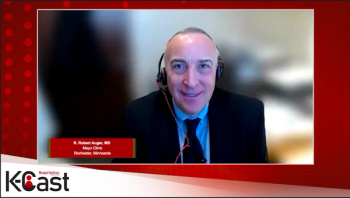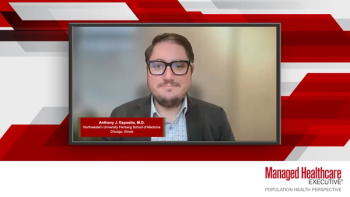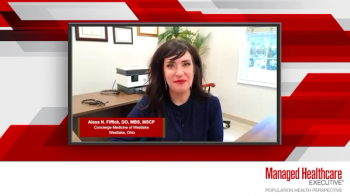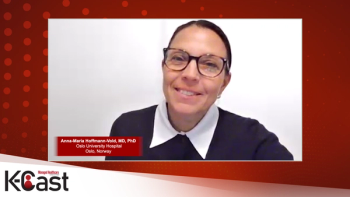
An expert discusses important considerations for clinicians when tailoring narcolepsy treatment plans for patients with complex comorbidities or lifestyle needs.

An expert discusses important considerations for clinicians when tailoring narcolepsy treatment plans for patients with complex comorbidities or lifestyle needs.

Major Medicaid cuts may be overshadowing work requirements, but they remain a priority for Republicans. Work requirements are “bad health policy,” says Leanne Berge, J.D., CEO of the Community Health Plan of Washington, although they would not have as great an impact as the cuts that have been under discussion.

Arti Masturzo, M.D., chief medical officer of CCS, spoke with Managed Healthcare Executive about the differences in coaching and guiding patients with type 1 diabetes compared to type 2.

Three Washington, D.C., healthcare policy experts and the former chief of staff of HHS dive into the healthcare politics and policies of the new administration: RFK Jr.’s confirmation hearings; the future of IRA drug price negotiations and PBM reform; Medicare Advantage under the new administration; DOGE cuts at HHS; and ant-DEI and the social determinants of health.

A panelist discusses how their institution is proactively adapting their formulary review processes and infrastructure to handle the growing biosimilar pipeline, while anticipating increased competition will drive strategic shifts in contracting and necessitate more flexible approaches to formulary management in the coming years.

An expert discusses the gaps or outdated elements in the American Thoracic Society (ATS) guidelines that have been identified.

An expert discusses the main treatment recommendations of the American Thoracic Society (ATS) guidelines for managing with idiopathic pulmonary fibrosis (IPF) and progressive pulmonary fibrosis (PPF).

Medicaid is a needs-based program, but the misconception that it is a program solely for poor people has made it a target for large federal budget cuts, says Leanne Berge, CEO of a not-for-profit health plan in Washington state.

Unlike some other spending cuts, Medicaid cuts will have direct impact on people who voted for Republicans in November 2024, according to Leanne Berge, health plan leader

An expert discusses the significance of low-sodium oxybate for patients with narcolepsy patients with and cardiovascular disease and compares the diagnostic criteria and clinical presentations of narcolepsy and idiopathic hypersomnia.

Conversations around menopause symptoms are becoming more common, but there is such a thing as potentially calling too much attention, especially in the workplace, according to Monica Christmas, M.D., director of the menopause program at the University of Chicago Medicine and the Center for Women’s Integrated Health.

A panelist discusses how their institution implements robust safety protocols including distinct labeling, electronic health record alerts, and staff education to prevent dispensing errors when managing multiple biosimilars, while also conducting targeted educational outreach to address stakeholder concerns about interchangeability.

Gaps in funding caused by the potential $5 billion budget cut to the National Institutes of Health would be “almost impossible” to fill, according to Aaron J. Kowalski, Ph.D., CEO of Breakthrough T1D.

Bias and stigma are to blame for the way women’s health research has fallen behind, according to Monica Christmas, M.D., director of UChicago Medicine’s menopause program and the Center for Women's Integrated Health and Valentina Sartori, Ph.D., a partner in McKinsey & Company’s Life Sciences Practice, and affiliated leader of the McKinsey Health Institute.

An expert discusses the management plan for patients with idiopathic pulmonary fibrosis (IPF) and progressive pulmonary fibrosis (PPF), highlighting approaches beyond pharmacotherapies.

An expert discusses the key side effects and contraindications associated with antifibrotic agents and how to monitor for and manage them.

Aaron J. Kowalski, Ph.D., CEO of Breakthrough T1D, spoke with Managed Healthcare Executive, about the possible impacts of the NIH’s cuts to indirect research funding.

An expert discusses treatments for narcolepsy, comparing options for managing excessive daytime sleepiness (EDS) and cataplexy, and examines the advantages, limitations, and clinical scenarios for medications targeting EDS versus compared with those for both EDS and cataplexy.

A panelist discusses how neurokinin-targeted therapies can be strategically combined with existing treatments to address multiple vasomotor symptoms (VMS) while highlighting their positive impact on patient quality of life, noting ongoing needs for long-term safety data and improved accessibility.

A panelist discusses how payer contract requirements and reimbursement policies significantly influence their institution’s biosimilar adoption strategy, requiring careful analysis of net cost benefits when weighing potential savings against the operational complexities of managing multiple products.

An expert discusses how nintedanib and pirfenidone differ in their mechanisms of action and efficacy in treating idiopathic pulmonary fibrosis (IPF).

An expert discusses the current understanding of corticosteroids in managing pulmonary fibrosis and how it has evolved in recent years, and identifies specific patient populations for whom steroids may remain a viable treatment option.

Menopausal patients are most interested in learning more about non-hormonal treatments to address their symptoms, according to the results of an international survey led by the Menopause Priority Setting Partnership (MAPS). Monica Christmas, M.D., director of the menopause program at the University of Chicago Medicine and the Center for Women’s Integrated Health, discussed the survey details with Managed Healthcare Executive.

An expert discusses how key symptoms of narcolepsy, such as excessive daytime sleepiness and cataplexy, impact daily functioning and quality of life, along with the primary differences between type 1 and type 2 narcolepsy in terms of pathophysiology, clinical presentation, and diagnostic criteria.

A panelist discusses how their institution prioritizes cost savings and reliable supply chain considerations when selecting biosimilars for formulary inclusion, while also weighing switching study evidence, addressing stakeholder concerns through education, and implementing protocols to overcome barriers such as electronic health record integration and prior authorization challenges.

Lindsay Bealor Greenleaf, head of Federal and State Policy at ADVI Health, talks with Managed Healthcare Executive about Robert F. Kennedy Jr., President Donald Trump’s HHS secretary nominee.

Potential threats to HIV care and fallout over the next four years, according to Jose Abrigo, Esq., HIV project director at Lambda Legal Defense and Education Fund and Carl Schmid, executive director of the HIV+Hepatitis Policy Institute.

A panelist discusses how their institution evaluates biosimilars for formulary inclusion through a systematic review process that examines clinical data, safety profiles, and cost implications while prioritizing operational efficiency, patient access, and seamless transitions between reference products and biosimilars.

Panelists discuss the potential role of emerging treatments in the progressive pulmonary fibrosis (PPF) landscape if approved, exploring how they could address key unmet needs, improve patient outcomes, and optimize healthcare resource utilization.

Panelists provide an overview of emerging therapies for progressive pulmonary fibrosis (PPF), highlighting the latest developments and potential treatment options.